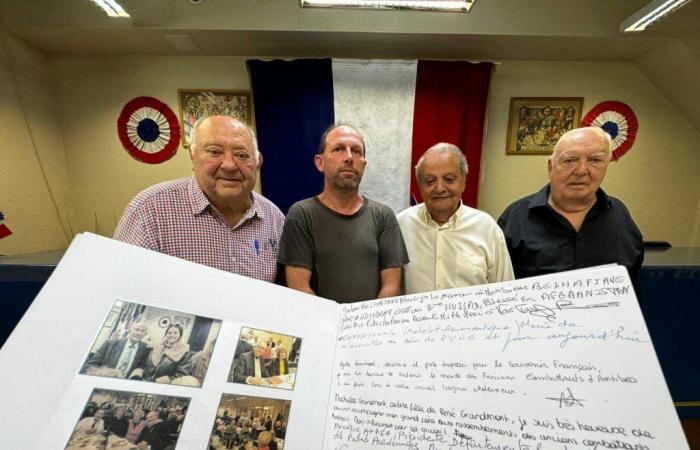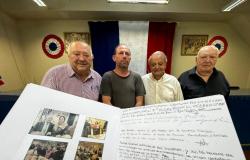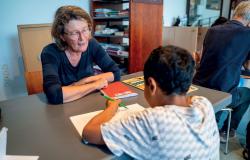
Between the pages of the guestbook, three years of indelible memories are gathered. “At each gathering, whether festive or ceremonial, veterans and their loved ones could leave a little note inside”says Paul Verner, treasurer of the National Union of Combatants (UNC) and former filmmaker, with an emotional smile.
A tradition reiterated since 1986, the date of birth of the Antibes Combatant’s House – which to date brings together 24 civil and military associations. But this time, memory is not limited to words alone.
“I shot and edited numerous video sequences of these moments of sharing and conviviality, which will be preserved,” explains the treasurer, not a little proud. Photographs also illustrate the left part of the book, where smiling faces pose in front of large tables.
A black box
Why does the Combatant’s House attach so much importance to this work? “The generation that experienced the Second World War has practically disappeared, and veterans of the Indochina and Algerian wars are becoming rarer every day”underlines Georges Trémoulet, vice-president of the National Federation of Resistant and Patriotic Deportees and Internees (FNDIRP).
A gradual erasure of living memory that associations consider vital “to pass on to future generations”before it’s too late. Especially since their attempts to open up to young soldiers from External Operations (Opex) bear little fruit.
“They are still young, and an organization like ours doesn’t mean much to them”deplores Christian Giampreti, president of the Combatant’s House.
Unfailing solidarity
However, the institution maintains a lively dynamic. “We do lots of things together,” assures the secretary general of the UNC, Philippe Ferdinand-Dreyfus.
“Even though we are no longer 20 years old, there is physical and moral mutual support between us. It is not uncommon to carpool, to watch over one of our members if he is sick or injured. We regularly give each other advice news. This avoids isolation, which affects many elderly people.
So, whenever they can, they organize “cohesion pots” and open the doors of their House every day, except Saturday (from 3 p.m. to 5 p.m.).
Portrait Gallery
Testimony of Marc Trubert, 88 years old, president of the UNC of Antibes
“During the Algerian War, I was posted as a simple soldier in Morocco. A tradition because, in my family, we all come from veterans since Napoleon. Recounting these memories between us is very important, some have exceptional journeys. The war is of course very painful, but I do not regret anything about my journey, the return to civilian life, at the end of the 1970s, was also difficult, because no one is waiting for you outside. …”
Testimony of Isabelle Erlich, 85 years old, treasurer of the FNDIRP
“I am the daughter of a veteran of the Second World War, a prisoner of war in Germany for 5 years. I lost five members of my family in the Auschwitz extermination camp. So pass on the memory of this era is a mission for me. I regularly organize minibus trips, the last time, it was to the Camp des Milles Memorial Site, in Aix-en-Provence.
Testimony of Louis Vieilledent, 85 years old, auditor of the UNC
“I arrived in the Navy in 1960, I was 19 years old. Immediately, I found myself with 400 other soldiers at the Siroco center, at Cape Matifou, in Bordj El Bahri, in Algeria. It was as a commando that I experienced very difficult times, including the loss of a friend killed by a machine gun burst in the stomach. We promised ourselves that we would go to Casablanca, but I went there without him… Experiencing it. war can be a real trauma.”
Testimony of Alexandre Degot, 43 years old, member of the UNC
“I am the youngest member of the Combatant’s House. I was present in Afghanistan as a sailor, between 2000 and 2010, during the second Gulf War. I took care of repatriations to Djibouti, on the edge of the Red Sea. Being a member of the UNC is a way of sharing my experience and understanding past wars. Then, in turn, I will be able to pass on this memory.
Testimony of Georges Trémoulet, 86 years old, vice-president of the FNDIRP
“My father having been chief of staff in 1940 in the 22nd battalion of Alpine hunters, I took a dip very early in the bath. In Algeria, I commanded an operational unit at an altitude of 900 meters, the summit being at 2,508 meters on a 40km front. A hell of a hunting ground. I was repatriated and then sent back during the Evian Accords. A very complicated period because the fellaghas wanted revenge. I joined all the associations.”





